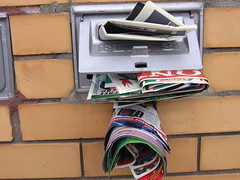Father Christmas
Despite the clamour of commercials and signs urging us to ‘Buy! Buy! Buy!’ there is something worth thinking about a lot more at Christmas: fathers.
No, not Father Christmas, or Santa Clause, or even St Nicholas – but fathers, dads. The Christmas mythologies and our contemporary, secular, commercialised celebrations can tell us quite a bit about fathers – what the world thinks of us, and what we think of ourselves. It gives us an opportunity to reflect on our roles and identities as dads.
Fathers have a strange place in Christmas traditions, stories and mythologies. Many place fathers in conflict and subsequent reconciliation with families – from your ‘It’s a Wonderful Life’ type story of dad’s personal redemption through to your stories of fathers rediscovering their families and children via the magic of Christmas.
Then you have the mythologies of Santa Claus as the jolly old man who is magical ‘father’ to all children – bringing gifts to nice children, and punishing (by omitting) naughty ones.
From this, I gather that Christmas is offered as a time for fathers to reconnect with their families – to find redemption with their children for their absences caused by (over)work or emotional and time distance – and to re-establish their identities as dads.
Strangely, it also resonates with the Santa Claus persona of ‘presents for children’ – only inversely: the greater a father’s absence or alienation from his children or family, the bigger or more expensive the presents. The more actively involved a father is in his family life, the more prepared he may be to question if too many presents are being bought or too much money is being spent on the children. Maybe. Sometimes.
I’m wondering about the maxim that what our children really want – and need – is more time and love from their fathers (and mothers), rather than greater or more desirable presents. Presence or presents? I don’t doubt the significance of the time and love I give my son. However, I’m really unsure about wanting to prove the point by being simple (read meagre) with presents. I am concerned with his potentially negative reactions to the presents he gets. I don’t want to see my son disappointed on Christmas day, any more than I want to spoil him rotten with things I can’t afford to buy.
I’m yet to truly test that maxim. Only reflect on it…
The fathers who also come to mind in this reflection are those who don’t fit the popular Christmas stories, but whose experiences are becoming increasingly common – fathers from separated families, divorced fathers, etc. Separation is so common that the re-negotiation of the ‘family’ Christmas has become so necessary.
Those who have worked things out with their former spouses/partners and kids are lucky enough to see their children for the Christmas season, if not for that day. Many go through the ‘you get Christmas lunch, I get dinner/Boxing Day’ routine; others alternate years; others find some other fit or solution.
Some poor bastards cry their guts out when they drop their kids off at the airport/bus/train-station, as their kids go back to Mum after their flying visit.
Meanwhile, the father who hasn’t worked things out with his ex finds Christmas the loneliest time of the year, often as he wonders if his ex (or her new partner) has trumped his presents to the kids with something bigger, brighter or better. Some go to their Mum’s for lunch and bitch about the ex. Others think they’re ‘back in the game’ as they make life uncomfortable for the women at whichever Christmas party or nightclub they’ve ended up at.
The kids are often forgotten pawns in this Christmas story.
The Christmas father who offers me the most fruitful reflection is often neglected in Christian and Christmas mythologies. Joseph, the father of Jesus, plays his part in the Christmas nativity plays throughout the world and then recedes into the background the rest of the year. Mary has traditionally had centre stage, along with Jesus, of course. But I wouldn’t be surprised if more people know of the Three Wise Men than they did of Joseph.
Yet Joseph’s role has central – and highly confronting – significance in the Christmas lesson for fathers. Yes, he is ideal: protecting Mary in her months of pregnancy, securing the shelter for birth to take place, and then protecting the mother and child as he leads them in that flight to Egypt as political refugees. Exemplary fathering.
But Joseph is also the symbol that challenges the still primitive European-Christian patriarchal values so prevalent today. He shows that a man can still father a child without being its biological father.
Of course, it is premised on the beliefs that Jesus is the son of God, and Mary conceived miraculously (would Christmas be the same without these myths?); but the lesson is important.
I think it is a profound challenge. It contradicts our notions of ‘true’ fathering (the biological), and asserts the idea of fathering as an expression of love rather than a biological and genetic imperative. This is important at a time when the media loves stories of men discovering the children they thought were theirs’ are biologically not, and seeking recompense from their wives/ex-wives for the ‘deceit’ and expenditure.
Joseph offers a slap in the face. Wake up! How can you father a child for however many years and then turn around and say ‘No, you’re not mine after all. I want my money back’.
Christmas affords us a time for reflection, but for very different purposes for me. This is part of my effort to secure some personal meaning from the Christmas celebration that doesn’t rely on the Christian mythologies of the birth of Jesus. But the Christmas story – and even the secular holiday that has supplanted it – holds many lessons for me on what it means to be a father.
I hope you get to wake up with your kids on Christmas morning and watch them opening their presents. It’s wonderful. If that doesn’t happen for you, I sincerely hope that you get some other time to spend with your kids.
If you’ve been too busy to pay attention to how excited your kids are about Christmas, or are too busy thinking about which wine to serve with the turkey, or whether two slabs of beer are better than one at Bazza’s party, stop. Go spend some time with your kids playing with their new toys. They may even enjoy a reindeer ride on your back more than their presents. For a minute.
But, remember – you’re a Dad. Happy Christmas to all.
Read more!





















